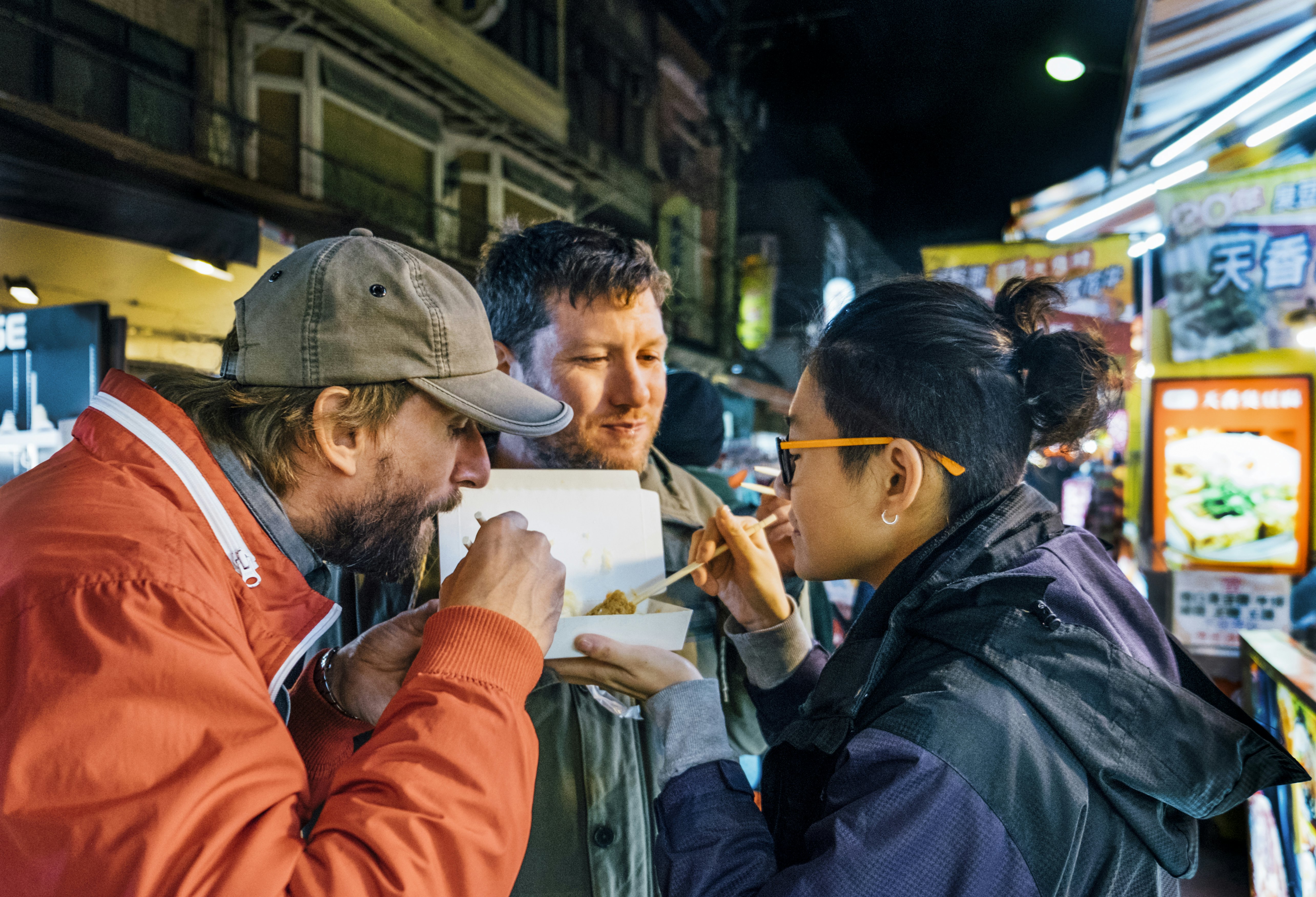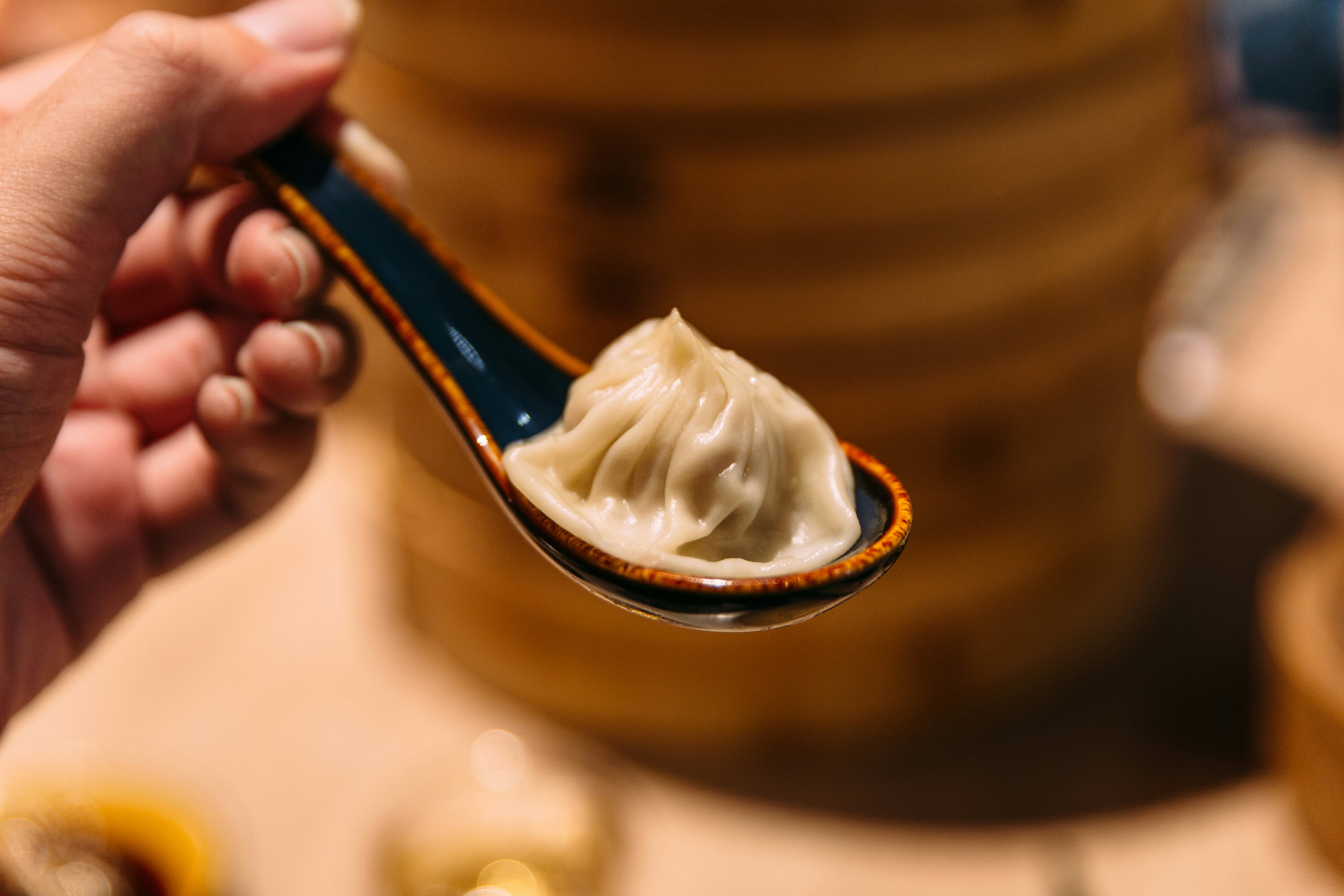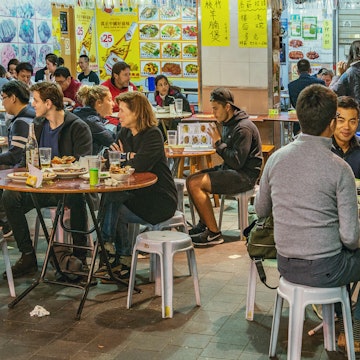

The Taiwanese love to snack © AJ_Watt / Getty Images
Taiwan is an island of food lovers where snacking is the national pastime, no matter the time of day (or night). Though it draws from Chinese Fujian, Cantonese, and Hakka flavors, Taiwan’s cuisine has evolved into something distinct, blending indigenous ingredients, Japanese influences and even some American elements to create a truly distinctive food culture.
You don’t need to go upmarket in Taiwan to eat the best food either – you’ll have some of the most profound dining experiences on the street, grazing past rows of mom ‘n’ pop stalls that fry, grill, or steam just one or two xiao chi (small eats) to perfection. Here’s our guide to the best dishes in Taiwan.

1. Slurp up a steaming bowl of beef noodle soup
Taiwanese beef noodle soup (台湾牛肉面) is the country’s national dish. It unites braised beef and chewy wheat noodles in a slow-simmered broth with a tickle of Sichuan spice and a tang of pickled mustard greens. It’s not surprising to learn that this cuddle in a bowl was created by folks pining for a taste of home – veterans of China’s civil war who had crossed the sea to Taiwan, bringing their regional recipes with them. Today, niurou mian is Taiwan’s de facto national dish (it has its own festival) and has even been credited with reversing the island’s long-held taboo on eating beef.
Where to try it: Yongkang Beef Noodles, Taipei.

2. Get your boba on in a big way
Boba cha, also known as bubble tea, pearl milk tea, or zhenzhu naicha (珍珠奶茶), is the drinks craze Taiwan gifted to the world. Served at roadside stands and in chain outlets, the classic edition shakes up tea, milk, ice, sugar, and chewy pearls of tapioca. But these days, it can be made with blended fruits, pureed taro, sweet potato balls, and even cheese – the more over-the-top, the better. But what almost all the boba variants have in common is a cocktail-style shake over ice before serving and an extra-wide straw to hoover up all those springy, syrupy ‘bubbles’ of tapioca along with the tea.
Where to try it: Chun Shui Tang, Taipei.

3. Embark on a street food safari after dark
Taiwanese have got it right – snacking just feels way more fun at night. At night markets all over the island, dozens of vendors – each typically family-run – dish up cheap, moreish mouthfuls under the glow of bare bulbs: think soups, sausages, squid skewers, sweet treats, stinky tofu, and stuff stuffed inside other stuff. Among Taiwan's most popular street foods is stinky tofu (臭豆腐), a pungent yet delicious dish that locals and adventurous visitors seek out at night markets. Be sure to try iconic street food dishes, like gooey oyster omelets (蚵仔煎), ‘salt-crisp’ fried chicken tossed with basil leaves and five-spice, and shaved ice desserts (剉冰) topped with red beans, mango, taro balls, and bathed in sweet condensed milk.
Where to try it: Miaokou Night Market, Keelung.

4. Savor the finest Shanghai-style soup dumplings
Din Tai Fung served its first-ever steamer of hand-pleated xiaolongbao (steamed pork dumplings filled with soup) in Taipei in 1972 and it endures as some of the most famous food in Taiwan. The original Xinyi Road branch is still going strong, with daily queues attesting to the quality and simplicity of its Shanghai fare. It also features warming wonton soup and pork cutlet over egg-fried rice. In 2010, the brand picked up its first Michelin star, not in Taipei but Hong Kong. Now truly a worldwide icon, the Taiwan-born chain has over 170 branches across the globe.
Where to try it: Din Tai Fung, Taipei.
5. Discover indigenous Taiwanese cuisine
For a less common experience, try the indigenous cuisines of Taiwan. Despite being overwhelmingly Han Chinese, Taiwan is home to half a million indigenous islanders from 16 officially recognized Peoples. These aboriginal Formosans have evolved a cuisine derived from the foraged fare of mountain veggies, seafood, and wild game. In Taiwan’s remote regions, you’re sure to come across wild boar served with onions and greens, steamed rice stuffed into bamboo tubes, and millet wine – once the tonic of tribal rituals. You might also encounter dishes of betel-nut salad, bird’s nest fern and even flying squirrel; everything that the forests and mountains have traditionally provided.
Where to try it: Taiya Popo, Yilain.
6. Bar hop through Taipei’s craft beer and cocktail scene
Taipei has taken to craft beer in a typically stylish and idiosyncratic way. En-vogue bars from the likes of Taihu, Sunmei, and Zhangmen (all home-grown brands) pour creative brews in thimble-sized glasses, harnessing the bold flavors of local ingredients like kumquats, longan honey, and smoked plums. Craft cocktails are booming too, with speakeasy-style joints like Ounce Taipei mixing masterful creations in a moody dark-wood setting.
Where to try it: Driftwood, Taipei.

7. Queue up for that scallion pancake
Done well, Taiwan’s spin on green-onion-and-fried-egg pancakes (蔥油餅; congyoubing) is food heaven on a shoestring – crisp, pillowy, and just oily enough to cure a hangover. Often sold from the humblest of carts, the best street food purveyors will have a line of hungry diners waiting. If you also see a cook of advancing years at the wok, you know you’re on to a good thing. Join that queue.
Where to try it: Raohe Street Night Market, Taipei.
8. Have a Hakka-themed banquet
Making up 15-20% of Taiwan’s population, the Hakka people are a Han Chinese subgroup with their own language, customs, and food. Heavy on the pork, tofu, and soy sauce, Hakka dishes are salty and strong-flavored without being spicy. Historically, the Hakka were farmers used to long days in the fields, so their food needed to be suitably hearty. The rural district of Meinong in Kaohsiung is overwhelmingly Hakka and a great place to try specialties like stuffed tofu, bantiao (glutinous rice noodles), braised pork hock, and the rich delight that is lei cha (ground tea).
Where to try it: Meinong Traditional Hakka Restaurant, Meinong.
9. Rip apart the world’s tastiest roast chicken
Weng yao ji (earthen kiln chicken) is the ultimate Taiwan road trip feast. Marinated mountain chickens are roasted whole in wood-fired urns that resemble giant tandoors, resulting in the perfect symphony of juicy, flavourful meat and crisp, golden skin. The go-to purveyor is Thumbs Up Chicken (spot the yellow fiberglass mascot outside), a raucous family restaurant chain with branches orbiting Taipei, where hundreds of birds are roasted daily, torn apart by gloved diners and gobbled up alongside mouth-watering stir-fries and icy bottles of Taiwan Beer.
Where to try it: Thumbs Up Chicken, Yilan.

10. Try an ice cream spring roll
One of the more fusion of Taiwan’s snacks, this burrito-like street food is assembled while you wait, a crepe folded around three scoops of fruit ice cream, shards of peanut candy, and sprigs of cilantro that cut through the sweetness with a floral zing. Called run bing (潤餅), the dish is a playful dessert riff on a savory spring roll of the same name originating from Fujian on the mainland and traditionally filled with shredded turnip, sausage, peanuts, and cilantro.
Where to try it: Ruifeng Night Market, Kaohsiung.
11. Vegetarians and vegans
Buddhist roots run deep, so most towns will have a few vegetarian and vegan eateries serving healthy Taiwanese food or utilizing ‘mock meat’ made of tofu or gluten to mimic well-known meat or fish dishes. Buddhist vegetarian restaurants and vegan food are easy to find. Just look for the large savastika (an ancient Buddhist symbol resembling a reverse swastika) hanging in front of the restaurant.
12. Taste the silky softness of Douhua
Douhua (豆花) is a soft tofu dessert that melts in your mouth with every bite. This light and silky treat is often served with a range of toppings, including sweet syrups, red beans, peanuts, and chewy tapioca pearls. Douhua is a comforting dessert that Taiwanese people have loved for generations. Its delicate texture and subtle sweetness make it an ideal way to cool off after a hearty meal or to enjoy as a refreshing midday snack, especially in Taiwan’s humid climate.
Where to try it: Beitou Market, Taipei.
13. Nibble on Tian Bu La
Tian Bu La (甜不辣) is Taiwan’s take on the fish cake, originating from Japanese oden but adapted with local flavors. These fried fish cakes are commonly served with a sweet and savory brown sauce and a side of pickled cabbage. The texture is pleasantly chewy, and the fish flavor is subtle yet distinct, making them a perfect snack to grab at a night market or as part of a street food feast. This dish highlights Taiwan’s knack for reinventing familiar foods with its own twist.
Where to try it: Ningxia Night Market, Taipei.
14. Enjoy the sweet decadence of pineapple cake
Pineapple cake (鳳梨酥) is a popular Taiwanese pastry that blends buttery, crumbly shortbread with a sweet-tart pineapple filling. While it was traditionally made with a mix of pineapple and winter melon, many modern versions now use pure pineapple for a more intense flavor. These small, square cakes are a signature treat in Taiwan, often brought home by visitors as gifts or souvenirs. Some variations include a salted egg yolk center, adding a savory contrast to the sweetness.
Where to try it: Chia Te Bakery, Taipei.
15. Savor the comforting simplicity of Lu Rou Fan
Despite its modest appearance, Lu Rou Fan (滷肉飯) is packed with flavor and is often considered one of the most beloved comfort dishes in Taiwanese cooking. The humble yet deeply satisfying meal is made from slow-braised minced pork belly served over a bowl of white rice. The pork is cooked in a soy sauce-based marinade, often infused with five-spice, garlic and a hint of sweetness, creating a fragrant, savory topping that seeps into the rice.
Where to try it: Jin Feng Braised Pork Rice, Taipei.
16. Indulge in Taiwanese Fried Chicken
Fried chicken (鹽酥雞) is a must-try Taiwanese street food, offering crispy, bite-sized pieces of chicken, often marinated in soy sauce and garlic, coated with sweet potato starch, and deep-fried to golden perfection. What sets it apart in Taiwanese recipes is the addition of fresh basil leaves tossed into the oil, which adds an aromatic, herbal flavor. Often dusted with a mix of five-spice and white pepper, Taiwanese fried chicken is a favorite late-night snack, served piping hot and extra crispy from street vendors across the island.
Where to try it: Shilin Night Market, Taipei.














